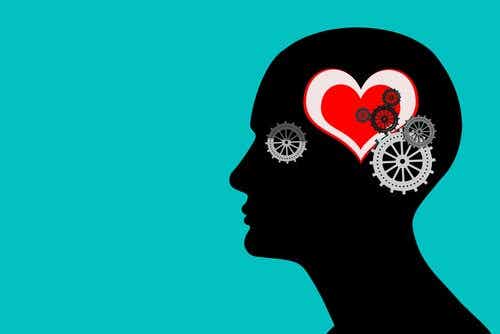It is necessary to cultivate emotional intelligence to achieve personal happiness and satisfaction.

Last update: April 14, 2022
Why is emotional intelligence important? It is the human capacity to recognize, express, understand, manage and transform one's own and others' emotions. It is therefore essential for proper personal growth. This cognitive faculty can be developed and enhanced over the course of a lifetime.
What really matters for success, character, happiness and lifelong results is a defined set of emotional skills - your EQ (Emotional Quotient) - and not just purely cognitive skills that are measured by conventional tests.
-Daniel Goleman-
Why is emotional intelligence important in adults?
Emotional intelligence in adults is very important because it greatly favors the establishment of healthy social relationships. In fact, it includes the ability to share and understand what others are feeling. Likewise, people with high levels of emotional intelligence are more likely to be successful in work, society, etc.
Psychologists Pablo Fernández Berrocal and Natalio Extremera ensure that those who optimally develop emotional intelligence they experience fewer negative emotional states and they tend to be happier, which promotes physical, psychological and social well-being.
Similarly, according to these two authors, when this cognitive faculty develops promotes emotional assimilation, which they define as “The ability to take feelings into consideration when we reason or solve problems. This focuses on how emotions affect cognitive processes and help us make decisions. This ability suggests that emotions have a positive effect on reasoning and information processing “.
In addition to this, emotional intelligence translates into other positive consequences for life, as it helps to enhance the abilities to:
- Adapt to difficult or complex situations or moments.
- Understanding how much pain can be caused to oneself and to others.
- Instill positive moods.
- Be more creative.
- Enjoy better psychological stability.
Why is emotional intelligence important in the child?
In the case of children, emotional intelligence refers to the awareness of their own identity; reflect on what you feel you want and do; and the ability to use one's emotions to one's advantage.
As in adults, emotional intelligence in the child is extremely important as it allows them to develop greater confidence in their abilities, which in turn allows them to make better decisions and maintain healthier relationships with peers.
In the same way, good emotional education during childhood will allow the child to be more assertive, that is, being able to express his emotions, taking into account those of others. In this way the child will not only learn to show affection to those around him, but will also develop other behaviors typical of a successful personality:
- Strong self-esteem
- Respect: for others
- More motivation and self-knowledge
- Less inclination to stress and depression
- Tendency to leadership
- Resilience in problematic situations
Emotional intelligence is important, so how do you improve this cognitive ability?
We share some things to consider if you want to improve your emotional intelligence. These are skills that, if not possessed, we should all try to develop.
Stay calm even under pressure
Many people today experience some degree of stress in everyday life. How these situations are handled can determine whether you feel emotionally exhausted or not.
Le people who continually feel upset and frustrated have to face this problem, trying to regain calm. For this it can be of great help to carry out a sporting, artistic or recreational activity, to practice relaxation techniques, etc. However, if stress or anxiety reaches high levels and affects your health, it is advisable to consult a psychotherapist.
Accept and deal with negative emotions
Learn to develop the ability to manage effectively the emonegative tions is essential to prevent them from being harmful, but how to do it? You have to try to restructure and change your way of thinking so that you can change negative or pessimistic ideas. This does not mean avoiding negative moods, but rather observing them and analyzing their origin.
Read well the signals sent by others
An interpersonal skill that allows you to accurately perceive and interpret other people's expressions, be they verbal, physical or emotional. This means not to misunderstand the intentions of those around you, thus avoiding misunderstandings.
When an expression is difficult to understand, it is advisable to look for a possible explanation before coming to a hasty conclusion or make judgments and accusations. Similarly, in case of doubt, it is always advisable to dialogue with the interlocutor to clarify the problem.
Expressing intimate emotions in personal relationships
To maintain close and lasting bonds, it is important to learn to effectively express intimate and more personal emotions, such as love, tenderness, respect, etc. It is also necessary to respond adequately to the manifestations of others. It is not a question of continually expressing what you feel, but the exchange of intimate emotions helps to cultivate and increase emotional relationships.
Expressing complex emotions when needed
Assertiveness is the ability to openly express thoughts, ideas and opinions, respecting the rights of oneself and of others. This includes being able to express disagreement under certain circumstances, without becoming hateful or aggressive. Being assertive means being able to set priorities and limits, without feeling guilty.
How to improve emotional intelligence in the child?
Stories with emoticons
Emoticons are figures that reflect emotions such as fear, joy, sadness or anger. In this case, the ideal would be to make masks with different emotions and tell the child a short story. Then, the little one will have to interpret the story using one of the masks. If the emotion represented is sadness, the child must interpret the story using the corresponding emoticon.
Expressing emotions through art
You have to write the names of at least 10 emotions on several sheets, so the child has to choose one at random and then express it through paint, cutouts or modeling material. We can suggest ideas to help him orient himself and express himself. Eventually we will be able to present the work to other people or colleagues, who will have to guess what emotion he wanted to express.


























